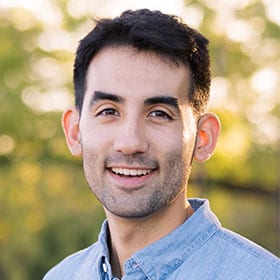Assistant Professor
UTHealth School of Public Health in Austin
FOCUS
All are affected by extreme heat, yet certain populations experience greater health burden. Low-income communities have constrained or unavailable resources to cope with heat, and discriminatory housing policies have led to a disproportionate number of individuals considered racial and ethnic minorities living in areas with elevated temperatures due to few trees and high amounts of heat-absorbing building materials. High temperatures increase individuals’ risk of heat exhaustion and heat stroke, and may be too uncomfortable for individuals to engage in physical activity. Kevin’s vision for a Culture of Health is to improve resilience to extreme heat for populations on the front lines of climate change. He aims to promote safe physical activity in warm climates for populations at risk of both heat-related illness and physical inactivity, including Latino children from low-income households. In divested neighborhoods, he aims to develop what can be called “Cool Corridors”—a network of infrastructure (e.g., parks, sidewalks, and bike lanes) providing opportunity for safe physical activity through a layering of heat management strategies (e.g., tree planting and shade structures). He believes Cool Corridors can be a scalable solution for climate equity in a warming world.
STRATEGIC INITIATIVE: Climate Change Health
The United States is experiencing a physical inactivity crisis: only one-half of adults and one-quarter of children are reaching recommended levels of physical activity for health and well-being. People of color and those who are economically disadvantaged often lack access to infrastructure such as parks and bike lanes, and have been found to disproportionately live in areas with higher temperatures due to racist policies (e.g., redlining) and continued disinvestment. Thermal discomfort from these elevated temperatures may serve as another barrier to physical activity. I will learn about individuals’ lived experience in relation to extreme heat and their physical activity behavior by conducting a survey of 1,500 individuals in Central Texas. I will reach these individuals by partnering with City of Austin’s Corridor Program Office, which has a database of individuals living along transit corridors. The Strategic Initiative is the critical first step towards the long-term goal of developing Cool Corridors–a spatially continuous network of physical activity infrastructure (e.g., parks, sidewalks) layered with heat management strategies (e.g., trees, shade structures). I believe all individuals have the right to environments supportive of safe physical activity.
MORE ABOUT KEVIN
Kevin approaches research with a transdisciplinary perspective developed from his training in environmental science, city planning, and public health. He partners with the community to design and implement adaptation strategies for extreme heat. In community work, he is a firm believer in the mantra “nothing about us without us is for us”. The goal of his research is to inform policies that eliminate health inequities based on race, ethnicity, and class in the face of warming from urbanization and climate change. As an Asian Latino living in a big city with a warm climate, Kevin takes this challenge personally.
KEVIN’S WORK AND VISION
- Opinion: How climate change worsens disparities among Austin kids (Austin American-Statesman)
- Degrees of Injustice: The Social Inequity of Urban Heat Islands (Northern California Public Media)
- MSNBC Yasmin Vossoughian Reports
- Google Scholar Profile
FOLLOW KEVIN

